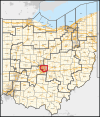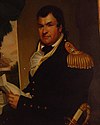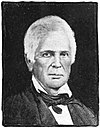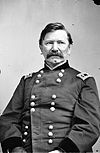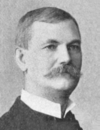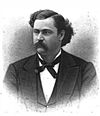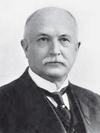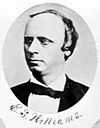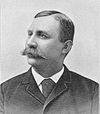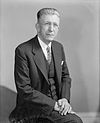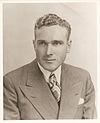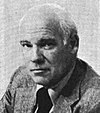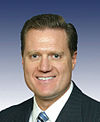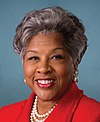Ohio's 3rd congressional district
 From Wikipedia the free encyclopedia
From Wikipedia the free encyclopedia
| Ohio's 3rd congressional district | |
|---|---|
Interactive map of district boundaries since January 3, 2023 | |
| Representative | |
| Distribution |
|
| Population (2023) | 784,597[2] |
| Median household income | $66,850[2] |
| Ethnicity |
|
| Cook PVI | D+20[3] |
Ohio's 3rd congressional district is located entirely in Franklin County and includes most of the city of Columbus. The current district lines were drawn in 2022, following the redistricting based on the 2020 census. It is currently represented by Democrat Joyce Beatty.
It was one of several districts challenged in a 2018 lawsuit seeking to overturn Ohio's congressional map due to alleged unconstitutional gerrymandering.[4] According to the lawsuit, the 3rd was "shaped like a snowflake" that was designed to "fracture" Columbus.[5] The plaintiffs focused on the 3rd in part because the 2013-2023 version of the district was barely contiguous. In some portions, it was almost, but not quite, split in two by the neighboring 12th and 15th districts which split the rest of Columbus between them.
The 2013-2023 map, drawn in private by Republican lawmakers in a Columbus hotel room, drew most of the heavily Democratic portions of Columbus into the 3rd, with much of the rest of Columbus split into the more Republican 12th and 15th districts. An alternative plan was to split Columbus between four districts, creating 13 safe Republican seats. In May 2019, the U.S. District Court in Cincinnati deemed the map unconstitutional, as intentionally drawn to keep Republicans in power and disenfranchise Democratic voters.[6] The U.S. Supreme Court discarded the district court ruling in October 2019.[7]
In 2018, Ohio voters approved a ballot measure known as Issue 1, which grants the minority party oversight on redistricting, requiring 50 percent minority party approval for district maps. The process will only take place after the 2020 census and presidential election.[8][6]
For most of the time from 1887 to 2003, the 3rd was a Dayton-based district; much of that territory is now the 10th district.
Election results from statewide races
[edit]| Year | Office | Result |
|---|---|---|
| 2000 | President | George W. Bush 52% - Al Gore 45% |
| 2004 | President | George W. Bush 54% - John Kerry 46% |
| 2008 | President | John McCain 51% - Barack Obama 47% |
| 2012 | President | Barack Obama 70% - Mitt Romney 29% |
| 2016 | President | Hillary Clinton 67% - Donald Trump 29% |
| 2020 | President | Joe Biden 70% - Donald Trump 28% |
List of members representing the district
[edit]Recent election results
[edit]The following chart shows historic election results. Bold type indicates victor. Italic type indicates incumbent.
| Year | Democratic | Republican | Other |
|---|---|---|---|
| 1920 | William G. Pickrel: 59,214 | Roy G. Fitzgerald: 59,214 | Clarence M. Gauger: 6,441 |
| 1922 | Warren Gard: 46,127 | Roy G. Fitzgerald: 52,111 | Joseph Woodward (S): 2,280 |
| 1924 | John P. Rogers: 43,426 | Roy G. Fitzgerald: 73,513 | Joseph Woodward (S): 1,021 |
| 1926 | T. A. McCann: 33,253 | Roy G. Fitzgerald | |
| 1928 | Frank L. Humphrey: 55,767 | Roy G. Fitzgerald: 101,050 | |
| 1930 | Byron B. Harlan: 62,107 | Roy G. Fitzgerald: 60,249 | |
| 1932 | Byron B. Harlan: 85,069 | Edith McClure Patterson: 66,107 | Jere F. Mincher (S): 4,178 |
| 1934 | Byron B. Harlan: 67,695 | Howard F. Heald: 56,480 | Jere F. Mincher (S): 1,293 Walter Jones (C): 724 |
| 1936 | Byron B. Harlan: 101,115 | Robert N. Brumbaugh: 70,023 | Leonidas E. Speer: 9,886 |
| 1938 | Byron B. Harlan: 58,139 | Harry N. Routzohn: 73,534 | |
| 1940 | Greg J. Holbrock: 103,291 | Harry N. Routzohn: 93,002 | |
| 1942 | Greg J. Holbrock: 48,338 | Harry P. Jeffrey: 51,477 | |
| 1944 | Edward J. Gardner: 104,247 | Harry P. Jeffrey: 94,064 | |
| 1946 | Edward J. Gardner: 65,749 | Raymond H. Burke: 71,171 | |
| 1948 | Edward G. Breen: 110,204 | Raymond H. Burke: 79,162 | |
| 1950 | Edward G. Breen: 92,840 | Paul F. Schenck: 77,634 | |
| 1951* | Paul F. Schenck | ||
| 1952 | Thomas B. Talbot: 107,551 | Paul F. Schenck*: 112,325 | |
| 1954 | Thomas B. Talbot: 74,585 | Paul F. Schenck: 82,701 | |
| 1956 | R. William Patterson: 93,782 | Paul F. Schenck: 135,152 | |
| 1958 | Thomas B. Talbot: 93,401 | Paul F. Schenck: 102,806 | |
| 1960 | R. William Patterson: 102,237 | Paul F. Schenck: 167,117 | |
| 1962 | Martin A. Evers: 85,573 | Paul F. Schenck: 113,584 | |
| 1964 | Rodney M. Love: 129,469 | Paul F. Schenck: 119,400 | |
| 1966 | Rodney M. Love: 53,658 | Charles W. Whalen, Jr.: 62,471 | |
| 1968 | Paul Tipps: 32,012 | Charles W. Whalen, Jr.: 114,549 | |
| 1970 | Dempsey A. Kerr: 26,735 | Charles W. Whalen, Jr.: 86,973 | Russell G. Butcke (AI): 3,545 |
| 1972 | John W. Lelak Jr.: 34,819 | Charles W. Whalen, Jr.: 111,253 | |
| 1974 | Charles W. Whalen, Jr.: 82,159 | ||
| 1976 | Leonard E. Stubbs Jr.: 33,873 | Charles W. Whalen, Jr.: 100,871 | Wilmer M. Hurst: 5,758 John R. Austin: 4,872 |
| 1978 | Tony P. Hall: 62,849 | Dudley P. Kircher: 51,833 | Alfred R. Deptula: 2,122 |
| 1980 | Tony P. Hall: 95,558 | Albert H. Sealy: 66,698 | Richard L. Righter: 2,903 Robert E. Tharpe: 1,710 |
| 1982 | Tony P. Hall: 119,926 | Kathryn E. Brown (L): 16,828 | |
| 1984 | Tony P. Hall: 151,398 | ||
| 1986 | Tony P. Hall: 98,311 | Ron Crutcher: 35,167 | |
| 1988 | Tony P. Hall: 141,953 | Ron Crutcher: 42,664 | |
| 1990 | Tony P. Hall: 116,797 | ||
| 1992 | Tony P. Hall: 146,072 | Peter W. Davis: 98,733 | |
| 1994 | Tony P. Hall: 105,342 | David A. Westbrock: 72,314 | |
| 1996 | Tony P. Hall: 144,583 | David A. Westbrock: 75,732 | Dorothy H. Mackey (N): 13,905 |
| 1998 | Tony P. Hall: 114,198 | John S. Shondel: 50,544 | |
| 2000 | Tony P. Hall: 177,731 | Regina Burch (N): 36,516 | |
| 2002 | Rick Carne: 78,307 | Mike Turner: 111,630 | Ronald Williamitis: 14 |
| 2004 | Jane Mitakides: 116,082 | Mike Turner: 192,150 | |
| 2006 | Rick Chema: 86,389 | Mike Turner: 121,885 | |
| 2008 | Jane Mitakides: 115,976 | Mike Turner: 200,204 | |
| 2010[9] | Joe Roberts : 71,455 | Mike Turner: 152,629 | |
| 2012[10] | Joyce Beatty : 201,921 | Chris Long : 77,903 | Richard Ehrbar III (L) : 9,462 Jeff Brown (WI) : 264 Bob Fitrakis (G) : 6,388 |
| 2014 | Joyce Beatty : 91,769 | John Adams: 51,475 | Ralph A. Applegate: 17 |
| 2016 | Joyce Beatty : 199,791 | John Adams: 91,560 | |
| 2018 | Joyce Beatty : 181,575 | Kim Burgess: 65,040 | Millie Millam: 62 |
| 2020 | Joyce Beatty : 227,420 | Mark Richardson: 93,569 | |
| 2022 | Joyce Beatty: 182,324 | Lee Stahley: 76,455 | |
| 2024 | Joyce Beatty: 243,991 | Michael Young: 97,389 |
1951 special election
[edit]*In 1951, after Breen's resignation for ill health, Schenck was elected in a special election to complete Breen's term.
2002
[edit]In 2002, when then-U.S. Rep. Tony P. Hall decided to accept an appointment as a U.N. ambassador, Richard Alan Carne took his place as the Democratic nominee for the congressional seat. Carne lost the race to former Dayton mayor Michael R. Turner.[11]
2006 election
[edit]On August 13, 2006, Democratic candidate Stephanie Studebaker— who was the party's nominee to run against the incumbent Republican— was arrested, alongside her husband, on charges of domestic violence. Two days later, she withdrew from the race, leaving the Ohio Democratic Party without a candidate in the district. A Special primary election to select a new Democratic candidate was held on 15 September 2006.[12] Richard Chema won that election with nearly 75% of the vote, but lost to Republican Michael R. Turner in the general election.
2010
[edit]| Party | Candidate | Votes | % | |
|---|---|---|---|---|
| Republican | Mike Turner* | 152,629 | 68.11 | |
| Democratic | Joe Roberts | 71,455 | 31.89 | |
| Total votes | 224,084 | 100.00 | ||
| Turnout | ||||
| Republican hold | ||||
2012
[edit]| Party | Candidate | Votes | % | ||
|---|---|---|---|---|---|
| Democratic | Joyce Beatty | 201,897 | 68.3 | ||
| Republican | Chris Long | 77,901 | 26.3 | ||
| Libertarian | Richard Ehrbar | 9,462 | 3.2 | ||
| Green | Bob Fitrakis | 6,387 | 2.2 | ||
| Independent | Jeff Brown (write-in) | 5 | 0.0 | ||
| Total votes | 295,652 | 100.0 | |||
| Democratic gain from Republican | |||||
2014
[edit]| Party | Candidate | Votes | % | |
|---|---|---|---|---|
| Democratic | Joyce Beatty (incumbent) | 91,769 | 64.1 | |
| Republican | John Adams | 51,475 | 35.9 | |
| Independent | Ralph A. Applegate (write-in) | 17 | 0.0 | |
| Total votes | 143,261 | 100.0 | ||
| Democratic hold | ||||
2016
[edit]| Party | Candidate | Votes | % | |
|---|---|---|---|---|
| Democratic | Joyce Beatty (incumbent) | 199,791 | 68.6 | |
| Republican | John Adams | 91,560 | 31.4 | |
| Total votes | 291,351 | 100.0 | ||
| Democratic hold | ||||
2018
[edit]| Party | Candidate | Votes | % | ||
|---|---|---|---|---|---|
| Democratic | Joyce Beatty (incumbent) | 181,575 | 73.6 | ||
| Republican | Jim Burgess | 65,040 | 26.4 | ||
| Independent | Millie Milam (write-in) | 62 | 0.0 | ||
| Total votes | 246,677 | 100.0 | |||
| Democratic hold | |||||
2020
[edit]| Party | Candidate | Votes | % | ||
|---|---|---|---|---|---|
| Democratic | Joyce Beatty (incumbent) | 227,420 | 70.8 | ||
| Republican | Mark Richardson | 93,569 | 29.2 | ||
| Write-in | 103 | 0.0 | |||
| Total votes | 321,092 | 100.0 | |||
| Democratic hold | |||||
2022
[edit]| Party | Candidate | Votes | % | ||
|---|---|---|---|---|---|
| Democratic | Joyce Beatty (incumbent) | 182,324 | 70.5 | ||
| Republican | Lee Stahley | 76,455 | 29.5 | ||
| Write-in | 18 | 0.0 | |||
| Total votes | 258,797 | 100.0 | |||
| Democratic hold | |||||
2024
[edit]| Party | Candidate | Votes | % | |
|---|---|---|---|---|
| Democratic | Joyce Beatty (incumbent) | 243,991 | 71.5 | |
| Republican | Michael Young | 97,389 | 28.5 | |
| Total votes | 341,380 | 100.0 | ||
| Democratic hold | ||||
Historical district boundaries
[edit]

See also
[edit]Notes
[edit]- ^ "Congressional Districts Relationship Files (State-based)". U.S. Census Bureau. Archived from the original on April 2, 2013.
- ^ a b "My Congressional District".
- ^ "2022 Cook PVI: District Map and List". Cook Political Report. Retrieved January 10, 2023.
- ^ Todd Ruger, "Voters Challenge Ohio Congressional Map as Partisan Gerrymander", Roll Call, May 23, 2018. Retrieved 7 August 2018.
- ^ Ohio A. Philip Randolph Institute et al., v. John Kasich, UNITED STATES DISTRICT COURT FOR THE SOUTHERN DISTRICT OF OHIO, filed 05/23/2018. Retrieved 7 August 2018.
- ^ a b "Ohio's Congressional Map Ruled Unconstitutional by Federal Court". May 3, 2019.
- ^ "Republicans Win Ohio Voting-Map Case as Supreme Court Tosses Ruling". Bloomberg.com. October 7, 2019.
- ^ "Ohio Voters Overwhelmingly Approve Issue 1, Limiting Congressional Gerrymandering". May 9, 2018.
- ^ "Representative to Congress: November 2, 2010." Ohio Secretary of State. Retrieved April 1, 2011
- ^ "2012 Election Results". Ohio Secretary of State.
- ^ Maisel, Louis Sandy; West, Darrell M. (2004), Running on empty?: political discourse in congressional elections, Rowman & Littlefield, p. 131, ISBN 978-0-7425-3076-8
- ^ "Ohio 2006 Midterm Election".
References
[edit]- Martis, Kenneth C. (1989). The Historical Atlas of Political Parties in the United States Congress. New York: Macmillan Publishing Company.
- Martis, Kenneth C. (1982). The Historical Atlas of United States Congressional Districts. New York: Macmillan Publishing Company.
- Congressional Biographical Directory of the United States 1774–present
